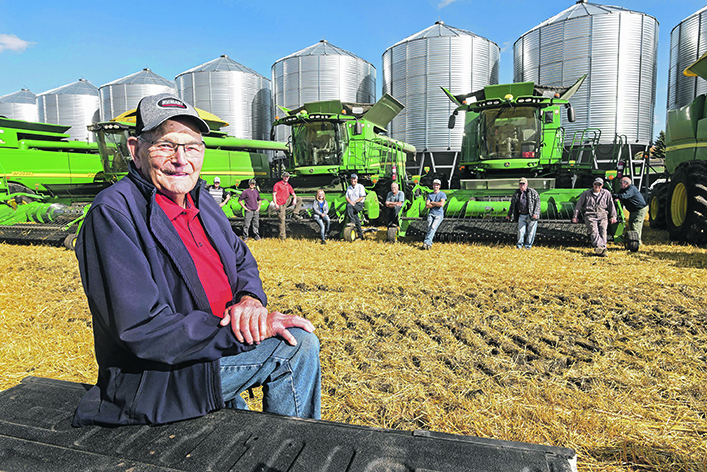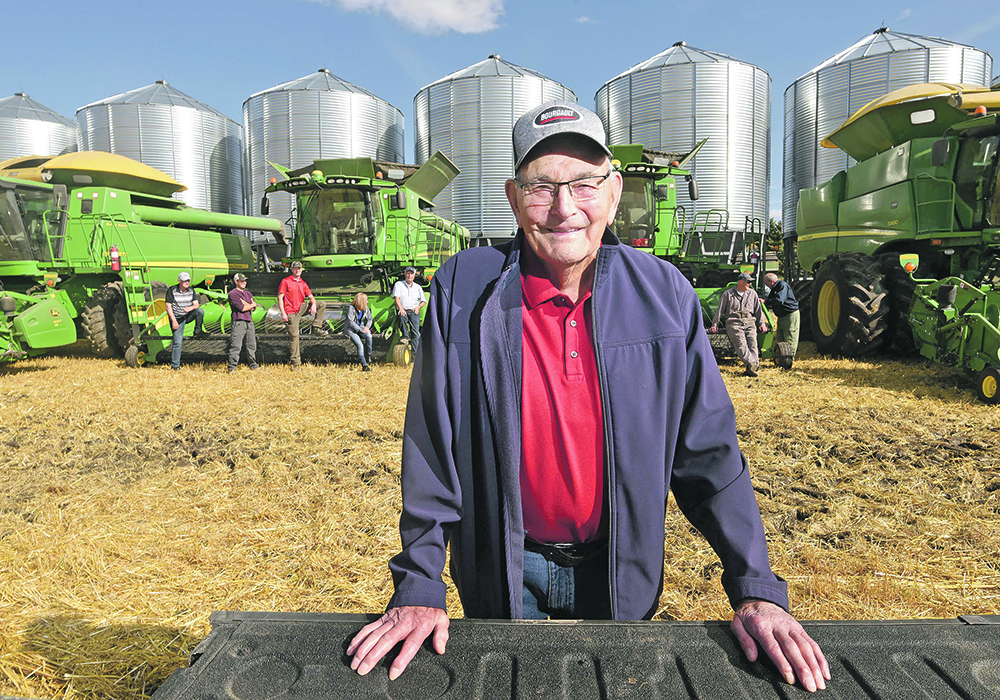Pliers and baling wire help carry a Saskatchewan farmer through 77 consecutive harvests — and he’s working on his 78th
ST. BRIEUX, Sask. — With 77 harvests under his belt, Lucien Fagnou keeps climbing the combine ladder.
He’s working on number 78.
“I’ve never missed a harvest in my whole life. This is really the start of my 78th harvest now. I’m not finished yet,” said the 91-year-old farmer.
In fact, Fagnou remembers the first time he combined a crop.
It was Aug. 19, 1942, a sunny harvest day on the Prairies at the family farm near St. Brieux, Sask.
When he was 13 years old, Fagnou and his father took their new combine, a Minneapolis-Moline pull-type model with a nine-foot straight-cut header, out to test a field of wheat.
When they got home that day, they heard the news about an Allied raid on the German occupied port of Dieppe in northern France. Of the 6,000 troops, 5,000 were Canadians — many of them farmers from the West and fishermen from Atlantic Canada — and they had sustained heavy casualties.
“When we came back to the yard my mother told us there was a raid that was on. At that time I had no idea what the war was, but after that, well, it was a disaster. It was terrible,” said Fagnou, his eyes filling with tears at the memory.
“A lot of our boys were involved with that and I’ll never forget.”
He was too young to enlist but Fagnou knew his duty and passion was to farm and assist the war effort by producing food.
“I wanted to help. We all wanted to help the war effort,” he said.
In those years, people paid cash for most things, including farm machinery.

“My dad had a little bit of money, but combines were not expensive in those days. It was harder to get than to buy,” he said.
Five years after his first harvest, the Minneapolis-Moline was sold to a neighbour and replaced with a new Massey Harris, an experimental self-propelled model not yet in full production.
“The number of it was 222 and it was a wee little thing. It only had a 10-foot table, but it was self-propelled with variable speed. It was quite efficient for the size of it.”
After about four years, it too was sold to a neighbour.
Then came a new Massey Harris 21A, followed by a combine sold through Canadian Co-operative Implements Ltd. in Western Canada.
“Dad had bought a Co-op combine, but it was really a Cockshutt self-propelled and that was a little bit more modern than the 21 Massey,” Fagnou said.
Around 1951, the farm bought an Oliver 33 that was in turn replaced with a self-propelled International Harvester.
While he’s not completely sure of the make or years, Fagnou said the family farmed mostly with IH or John Deere combines after that.

“Dad was the type that always wanted better, more modern, so more efficient and a bigger combine. We had accumulated a little more land at that time too so we needed something bigger. He did buy new, but he did buy quite a few used ones also.”
Taking after his father, Fagnou became known for his exceptional mechanical abilities, as well as thrift. He could buy low, overhaul a combine and tractor, and make them as good as new.
That was a necessary thing as modern combines got more complicated and more expensive to fix.
“In my time a pair of pliers and a roll of wire went a long way, but nowadays it’s not like that,” he said.
Read Also

Farming Smarter receives financial boost from Alberta government for potato research
Farming Smarter near Lethbridge got a boost to its research equipment, thanks to the Alberta government’s increase in funding for research associations.
His son, Edward, describes his father as ingenious yet practical because even back then machine repairs weren’t simple.
Fagnou said operating modern combines is easy and enjoyable compared to the open cab machines of his youth.
“Sitting in that combine today is just next to being in the living room, except the TV picture is not there. Otherwise the rest is all there. The comfort is just out of this world,” he said.
Fagnou remembers many harvests when he could not dress warmly enough to be comfortable while operating those early machines.
“There’s been some that I’ve combined in November on a 55 John Deere, which you’re up on top in the air. Cold, you have no idea. You’re chilled to the bone.
“Oh my God, that was suffering. It was a fairly clean combine because the operator is high up and out of the dust, but you weren’t out of the cold weather,” he said.
“We didn’t have the clothes either in those years. You had a big parka, that was the extent of it. It was not warm, that’s for sure. But we survived. You do the best you can.”
On the flip side, some harvests were like cutting butter — easy and free of stress.
“There was some that we started in the fall and kept on going right through and it was finished early and easy; couldn’t get it much better, actually,” he said.
This year’s harvest is shaping up to be a better one, he added.
“It’s pretty good actually. I’ve seen a lot worse than this.
“And the crops nowadays, that’s one thing I noticed. The yields today are so much higher than they were when I farmed because of the varieties and the amount of fertilizer we use. It’s unbelievable the yields we can get now.”

Fagnou has been helping his cousins, Craig Fagnou and his father Marcel, for years and while he’s the senior man on the crew of five combines, his knowledge and skills are in demand.
“Lucien not only comes out and runs a combine for us during the day, but if we have a breakdown and Craig happens to be working in the evenings on repairing it, he’ll stay here until 10 at night to give him the chance to do repairs,” said Marcel.
“At 91, he’s still as sharp as a tack and he doesn’t have a lazy bone in his body. And as far as helping us, it’s a blessing. We just enjoy having him here and he does more than his share.”
However, Fagnou would have it no other way because of all the farming activities, harvest continues to be the most satisfying.
“It’s always rewarding. Nobody ever said it was going to be easy. It was always quite hard, but it was very interesting keeping the machine going and be efficient. And it was always a pleasure to have a harvest end,” he said.



















